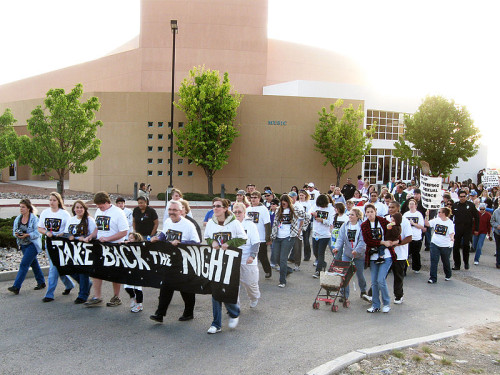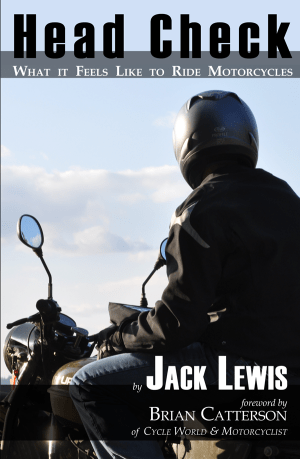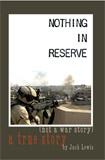This is an unconventional re-run, not a piece I wrote a while back and recently disinterred, but a speech prepared hastily (was there any other way?) nearly 25 years ago by a callow undergraduate looking for answers. Half a lifetime later, I’m a little embarrassed to put it up here — the confident righteousness of naivete fairly rings from the page — but after giving due consideration to the opinions of two admirable women who requested that it see, once again, the light of day, I’ve transcribed the speech here, word for word from my original draft.
It was the keynote address for WSU’s 1989 Take Back The Night march. There is anecdote in it, but there is also data. Both are painful.
This isn’t an unusual message. It appears in various forms across U.S. and international media. It concerns me that, a quarter-century later, this version would still seem usefully relevant to anybody. The daughters seem to get it, but in sowing the shape of tomorrow into the soft heads of boys, we haven’t come nearly as far as we should.
In a world where those daughters remain at substantial risk, let’s not stop here.
=========================================
I’m going to have to begin with the standard disclaimer: you’re looking at someone far more comfortable with a pen than a microphone. So, if I crack up halfway through this, please bear with me ‘til I recover my voice. Disclaimer number two is in the area of direct experience: I’m not a rape victim, nor am I a rapist. Of course, I’m not a statistician, either, but after I mention some statistics that have affected my outlook, you may begin to appreciate my position.
One of the statistics is a personal one. I’ve had a number of siblings attend this school: specifically, four sisters. Of these four young women, two were assaulted by men. My oldest sister was beaten several times by her boyfriend, both before and after she told him she never wanted to see him again.
The man claimed to be in love with her. It seems he was so deeply in love that he traced her down after she left this campus to attend USC – and blackened both her eyes.
My youngest sister was at WSU for part of one semester before she was raped. She withdrew from the university in bewilderment and disgust. She was nineteen.
Two out of four, people. FIFTY PERCENT. That’s a big number, and I don’t care to be told that it’s not a “representative sample,” because it means something to me – it means a hell of a lot to me.
It means my two talented and attractive sisters are unable to trust men, or make personal commitments of fidelity without fear. It means head-banging frustration for a whole family searching for something to do about those two animals who jogged off into the night, untouched. It means unearned pain. It means unhealing scars. Because people, there’s no cure for a rape that already happened.
There’s also very little sanction for the rapist; at least, there’s very little sanction according to local custom. Here’s another statistic for you: despite a large number of reported, documented rapes, the total number of first degree rape convictions in Whitman County – over the past EIGHTEEN YEARS – is two. That’s an average of one every nine years, or “point one repeating” rapes per year. Anybody buy that?
Of course not – if you did, you wouldn’t be here. Which means, really, I’m talking to the wrong people tonight… preaching, as it were, to the converted. Much as I’m flattered by the opportunity to address you here, my wringing my hands behind a podium isn’t going to change those ugly stats.
The march, though – that was positive. The requirement for changing attitudes is that you address those whose attitudes need changing. To stop rape, address potential rapists.
Even jailing every rapist that ever committed the act won’t stop rape, because criminals never plan on getting caught. Mad dogs are routinely shot. That’s a necessary step, and it stops individual mad dogs, but as long as rabies exists, there will be more dangerous dogs. You have to stop the disease.
- Image courtesy of Wikimedia Commons
The social disease of rape starts in men’s heads, with the attitude that each woman is some sort of gatekeeper of virtue, and that if she allows a man past that gate (wherever and however it’s defined), she becomes a deserving, even willing accomplice to a sexual mauling. That she’s “stupid,” or “a slut.”
Men have no psychological, ego-driven requirement to feel that way. By no means do all men feel that way. But some do – a dangerous percentage does – and if you want to know why, just pay attention to conversations around this campus. People are trained by their environment, and our society is filled with little clues that tell boys and men that it’s OKAY to think of females as sexual targets, instead of humans who can be hurt.
To change the response, we need to change the stimulus. We need to substitute protection for predation, compassion for sexual cynicism. Don’t just talk to each other; all of you already know the answers.
Talk to the men in your offices; talk to the kids in your classrooms; talk to the boys in the band; talk to your husbands, and your lovers.
Most importantly, talk to your sons.
Thank you.
=========================================
There’s work to be done yet.




 "Jack Lewis takes the overall literary crown with his new book...there’s a lot more to Lewis’s work than what it feels like to ride motorcycles.” — Ultimate Motorcycling
"Jack Lewis takes the overall literary crown with his new book...there’s a lot more to Lewis’s work than what it feels like to ride motorcycles.” — Ultimate Motorcycling
 "Insightful and from the heart ... a driven and much recommended look into the mind and conflict of the next generation of war veterans. " — Midwest Book Review (Reviewer's Choice)
"Insightful and from the heart ... a driven and much recommended look into the mind and conflict of the next generation of war veterans. " — Midwest Book Review (Reviewer's Choice)